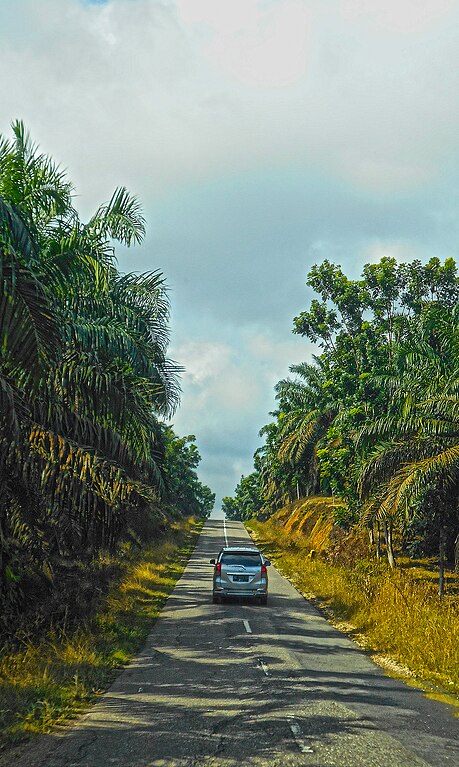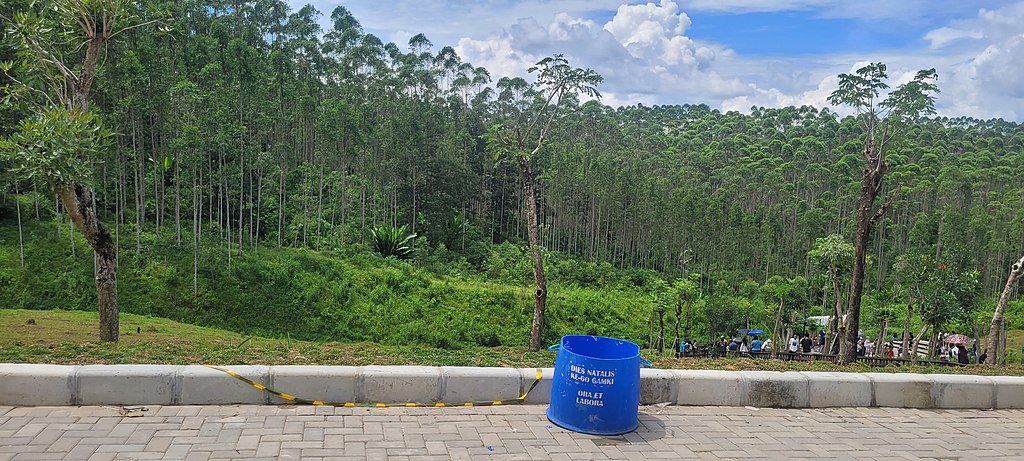
Thammasat University students interested in ASEAN studies, Indonesia, political science, sociology, history, economics, and related subjects may find it useful to participate in a free 27-28 October Zoom webinar conference on The Road to Nusantara: Process, Challenges, and Opportunities.
The event, on Thursday, 27 October and Friday, 28 October 2022 at 9am Bangkok time, is co-organized by the Indonesia Studies Programme at ISEAS – Yusof Ishak Institute (ISEAS), Singapore, and the Institute of Social Sciences and Humanities (IPSH), National Research and Innovation Agency (BRIN), Indonesia.
The TU Library collection includes several books on different aspects of the term Nusantara in Indonesian history.
The Capital City of Nusantara is the future capital of Indonesia, set to be inaugurated in August 2024 with celebrations of the country’s national day. The planned city will replace Jakarta, the national capital since 1945. Located on the east coast of the island of Borneo in what is currently part of the province of East Kalimantan, the city is expected to encompass an area of 2,560 km2 (990 sq mi), featuring a hilly landscape, forest, and a bay. Nusantara is expected to be formed as a new province splitting from East Kalimantan, similar to that of the capital region of Jakarta.
Construction of Nusantara started in July 2022, clearing land and laying down access roads, with construction of the first phase – Government Central Area zone, comprising government offices, schools, hospitals and shopping malls – beginning the following month. Initially, 100,000 workers from all over Indonesia will be sent to the Nusantara location to begin construction.
Nusantara (archipelago) is an Old Javanese term initially referring to conquered territories of the Majapahit empire, corresponding to present-day Indonesia.
Students are invited to register for the webinar at the following two links:
https://us06web.zoom.us/webinar/register/WN_7YHwW-wESr25mmHO-r0q_g#/registration
and
https://us06web.zoom.us/webinar/register/WN_EdqLNTcXTgKd7UwsaCnKug#/registration
As the event website explains:
About the Conference
After many years of discourse, the Indonesian government has decided to relocate the capital city from Jakarta to Penajam Paser, East Kalimantan. Due to its numerous socioeconomic and environmental urban problems, Jakarta is deemed to be unsuitable as the country’s future capital city. The new capital city, named Nusantara, is considered to be less exposed to natural disasters, and is strategically located in the country’s geographical centre. Relocating the capital city to East Kalimantan is perceived as a political strategy to redirect the government’s attention to other regions outside Java, create a new symbol of national identity and arguably promote national unity. Additionally, this will attract investment to new areas and to achieve equitable regional development in the country. Nevertheless, despite the above-perceived benefits, there are scepticism if the government can realise the project as it has imagined.
The new capital, Nusantara, will be a massive project supported by various policy decisions at the national and sub-national levels. With the current administration having less than two years in its term to prepare the legal and policy foundation and basic infrastructure for this historic relocation, questions remain on the feasibility and continuity of the ambitious project. There is a risk that the new government in 2024 may no longer support or even change the new capital project. Moreover, the project has not yet been able to draw interest from foreign investors. This Conference will explore the complex process of realising the Nusantara project and discuss the challenges and opportunities that could arise during the government’s transition period. The project’s potential impact on the broader region makes it a relevant topic for Southeast Asian policymakers and scholars of today.

As Bloomberg News reported in August,
Indonesia Breaks Ground on Its New Capital City
Indonesia has begun clearing land to build the new city of Nusantara from scratch in a bid to alleviate overcrowding in Jakarta and promote equitable economic growth.
Indonesia has started work on its new capital and is on course to complete the city’s first phase of development by 2024 with government funding, according to the top official overseeing the project.
Eventually, 80% of financing for the $34 billion project will come from the private sector, said Indonesia’s Bambang Susantono in an interview on the sidelines of the World Cities Summit in Singapore. Discussions with investors are ongoing, and Indonesia is likely to consider a bond issuance later on, he said.
“At this point, no delays. We are on track, more than before, because the objective and the direction from the president is that he wants to have commemorations of our independence day in Nusantara in August 2024,” Susantono said. Phase one of the project, costing about 50 trillion rupiah ($3.4 billion) will be funded completely by the 2022-2024 state budget, he said.
That spending required to relocate Indonesia’s government from the current capital of Jakarta is taking place as the nation’s central bank anticipates slower economic growth this year. But concerns of congestion and overcrowding in Jakarta, coupled with the fact that the city is sinking, is pushing Indonesian President Joko Widodo — better known as Jokowi — to move ahead with the plan.
There are also potential political and economic benefits. Undertaking the gargantuan task of shifting the capital to a remote part of the forest-covered island of Borneo would be a hallmark of Jokowi’s political legacy, even though the idea of transferring the capital originated from the country’s first leader Sukarno. Importantly, the move signals Indonesia’s ambitions to be an economic powerhouse that’s also able to better spread the wealth among its 267 million citizens.
“We want to be a high income society, and the transformation has to start, and has to start now,” Susantono said. “It’s time for us also to try and redistribute the economic growth and this Nusantara will be the catalyst.”
Promoting economic equality and inclusivity is part of the government’s aim to maintain its environmental, social and governance, or ESG, “credibility” given there’s an increasing emphasis in that area among investors, said Susantono, a civil engineer-turned-economist who was formerly the vice-president of the Asian Development Bank.
The first phase of Nusantara will comprise largely government buildings as well as schools, hospitals and entertainment amenities such as shopping malls, Susantono said. Work has already begun, including clearing land and creating access roads for workers. The target is to have around 1.7 million to 1.9 million people residing in Nusantara by 2045…

(All images courtesy of Wikimedia Commons)
